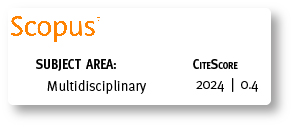Preliminary assessment of the numerical competencies of children from a public preschool and kindergarten in Cuenca
DOI:
https://doi.org/10.18537/mskn.06.01.04Keywords:
early numeracy, preschoolers, kindergartners, mathematical competenciesAbstract
There is abundant evidence that young children are capable of developing mathematical knowledge and that the arithmetic skills of young children are a predictor of their future academic achievement. There is also a common agreement that the quality of early mathematical instruction has an important influence on children´s subsequent learning. In Ecuador studies on young children´s early mathematical competencies and instruction are scare. Therefore a study was initiated to (1) assess the numerical competencies of preschoolers and kindergartners (first year of elementary education) attending a public school in Cuenca, with the objective to critically analyze their numerical thinking and reasoning, and (2) examine teachers’ practices and believes regarding early mathematical instruction and children´s mathematical competencies. An application of the Number Knowledge Test (Griffin, 2005) demonstrated that most of the participating children had not developed basic numerical competencies. In addition, teachers strongly believe that young children are incapable of carrying out mathematical thoughts. As a consequence, mathematical activities in which children and teachers are engaged are insufficiently developed. The scientific and practical implications of these results are discussed.
Downloads
Metrics
References
Aunio, P., M. Niemivirta, 2010. Predicting children’s mathematical performance in grade one by early numeracy. Learn. Individ. Differ., 20, 427-435.
Barnett, W.S., C.R. Belfield, 2006. Early childhood development and social mobility. Future Child., 16(2), 73-98.
Baroody, A.J., 2001. The developmental bases for early childhood number and operations standards. Invited paper written for the follow-up conference to the Conference on Standards for Preschool and Kindergarten Mathematics Education. Dallas, Texas, USA.
Baroody, A.J., 2004. The developmental bases for early childhood number and operations standards. In: Clements, D.H., J. Sarama, A.-M. DiBiase (Eds.), Engaging young children in mathematics: Standards for early childhood mathematics education, pp. 173-219. Publisher: Mahwah, NJ, Lawrence Erlbaum Associates Inc.
Baroody, A.J., M. Cibulsksis, M. Lai, X. Li, 2004. Comments on the use of learning trajectories in curriculum development and research. Math. Think. Learn., 6, 227-260.
Baroody, A.J., M.-I. Lai, K.S. Mix, 2006. The development of young children’s number and operation sense and its implications for early childhood education. In: Spodek, B., O.N. Saracho (Eds.), Handbook of research on the education of young children (2nd ed.), pp. 187-221.
Bereiter, C., S. Engelman, 1966. Teaching disadvantaged children in the preschool, 312 pp. Englewood Cliffs, NJ: Prentice-Hall.
Clements, D.H., 2004. Major themes and recommendations. In: Clements, D.H., J. Sarama, A.-M. DiBiase (Eds.): Engaging young children in mathematics: Standards for early childhood mathematics education, pp. 7-72. Publisher: Mahwah, NJ, Lawrence Erlbaum Associates Inc.
Clements D.H., J. Sarama, 2007. Early childhood mathematics learning. In: Lester, F.K., Jr. (Ed.), Second handbook of research on mathematics teaching and learning. Charlotte, NC: Information Age, 724 pp.
Clements D.H., J. Sarama, C.B. Wolfe, 2011. Tools for early assessment in math (TEAM). Teacher´s Guide. Mc Graw Hill Education Series.
Copley, J.V., 2004. The early childhood collaborative: A professional development model to communicate and implement the standards. In: Clements, D.H., J. Sarama, A.-M. DiBiase (Eds.), Engaging young children in mathematics: Findings of the 2000 national conference on standards for preschool and kindergarten mathematics education, pp. 83-87. Publisher: Mahwah, NJ, Lawrence Erlbaum Associates Inc.
De Smedt, B., L. Verschaffel, P. Ghesquiere, 2009. The predictive value of numerical magnitude comparison for individual differences in mathematics achievement. J. Exp. Child Psychol., 103, 469-479.
Duncan, G.J., C.J. Dowsett, A. Claessens, K. Magnuson, A.C. Huston, P. Klebanov, C. Japel, 2007. School readiness and later achievement. Dev. Psychol., 43, 1428-1446.
Evans, G.W., J. Rosenbaum, 2008. Self-regulation and the income-achievement gap. Early Child. Res. Q., 23(4), 504-514.
Fuson, K., 2004. Pre-K to grade 2 goals and standards: Achieving 21st century mastery for all. In: Clements, D.H., J. Sarama, A.-M. DiBiase (Eds.), Engaging young children in mathematics: Standards for early childhood mathematics education, pp. 105-148. Mahwah, NJ: Lawrence Erlbaum Associates Inc.
Geary, D., 2011. Cognitive predictors of achievement growth in mathematics: A 5-year longitudinal study. Dev. Psychol., 47, 1539-1552.
Gelman, R., C.R. Gallistel, 1978. The child´s understanding of number. Cambridge, MA: Harvard University Press.
Ginsburg H.P., A.J. Baroody, 2003. Test of early mathematics ability (3rd ed.). Austin, TX: PRO-ED.
Greenes, C., H.P. Ginsburg, R. Balfanz, 2004. Big math for little kids. Early Child. Res. Q., 19, 159-166.
Griffin, S., 2004. Building number sense with number worlds: A mathematics program for young children. Early Child. Res. Q., 19, 173-180.
Griffin, S., 2005. Fostering the development of whole-number sense: Teaching mathematics in the primary grades. In: Donovan, M.S., J.D. Bransford (Eds.) How Students Learn: History, mathematics, and science in the classroom. Committee on How People Learn, A Targeted Report for Teachers. Division of Behavioral and Social Sciences and Education, Washington DC: The National Academies Press.
Griffin, S., R. Case, 1997. Re-thinking the primary school math curriculum: An approach based on cognitive science. Issues Educ., 3, 1-49.
Jordan, N.C., J. Glutting, C. Ramineni, 2010. The importance of number sense to mathematics achievement in first and third grades. Learn. Individ. Differ., 20, 82-88.
Jordan N.C., D. Kaplan, L.N. Olah, M.N. Locuniak, 2006. Number sense growth in kindergarten: A longitudinal investigation of children at risk for mathematics difficulties. Child Dev., 77, 153-175.
Jordan N.C., D. Kaplan, C. Ramineni, M.N. Locuniak, 2009. Early math matters: Kindergarten number competence and later mathematics outcomes. Dev. Psychol., 45, 850-867.
Kilpatrick, J., J. Swafford, B. Findell, 2001. Adding it up. Helping children learn mathematics. Washington DC, National Academy Press.
Krajewski, K., W. Schneider, 2009. Exploring the impact of phonological awareness, visual-spatial working memory, and preschool quantity-number competencies on mathematics achievement in elementary school: Findings from a 3-year longitudinal study. J. Exp. Child Psychol., 103, 516-531.
Ministerio de Educación, 2012. Rendición de cuentas 2011, Quito, Ecuador.
Ministerio de Educación (2013). Archivo maestro de instituciones educativas AMIE. Reporte de registros educativos 2013-2014.
Piaget, J., 1969. The psychology of the child. New York: Basic Books.
Raudenbush, S.W., 2009. The Brown legacy and the O´Connor challenge: Transforming schools in the images of children´s potential. Educ. Res., 38, 169-181.
Sarama, J., D.H. Clements, 2009. Early childhood mathematics education research: Learning trajectories for young children. New York: Routledge.
Sophian, C., 2004. Mathematics for the future: Developing a head start curriculum to support mathematics learning. Early Child. Res. Q., 19, 59-81.
Starkey, P., A. Klein, A. Wakeley, 2004. Enhancing young children’s mathematical knowledge through a pre-kindergarten mathematics intervention. Early Child. Res. Q., 19, 99-120.
UNESCO, 2008. El Laboratorio Latinoamericano de Evaluación de la Calidad de la Educación (LLECE). Los aprendizajes de los estudiantes de América Latina y el Caribe, Santiago, Chile.
Van de Rijt, B.A.M., J.E.H. Van Luit, A.H. Pennings, 1999. The construction of the Utrecht early mathematical competence scales. Educ. Psychol. Meas., 59, 289-309.
Warfield, J., 2001.Teaching kindergarten children to solve word problems. ECEJ, 28, 161-167.
Wright, R.J., 1994. A study of the numerical development of 5-year-olds and 6-year-olds. Educ. Stud. Mathem., 26, 25-44.
Downloads
Published
How to Cite
Issue
Section
License
Copyright © Autors. Creative Commons Attribution 4.0 License. for any article submitted from 6 June 2017 onwards. For manuscripts submitted before, the CC BY 3.0 License was used.
![]()
You are free to:
 |
Share — copy and redistribute the material in any medium or format |
 |
Adapt — remix, transform, and build upon the material for any purpose, even commercially. |
Under the following conditions:
 |
Attribution — You must give appropriate credit, provide a link to the licence, and indicate if changes were made. You may do so in any reasonable manner, but not in any way that suggests the licenser endorses you or your use. |
| No additional restrictions — You may not apply legal terms or technological measures that legally restrict others from doing anything the licence permits. |









